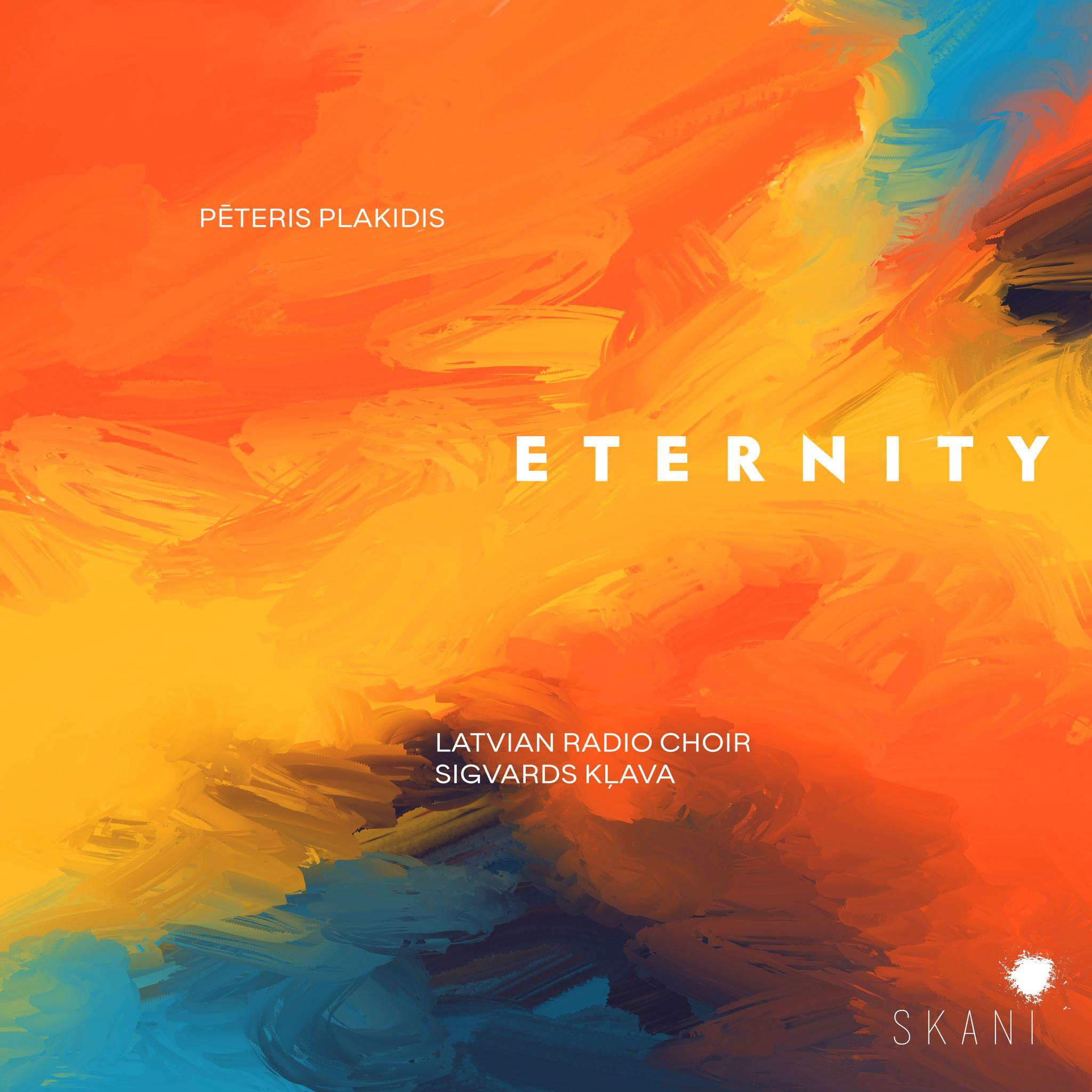Latvian composer Pēteris Plakidis, who passed away in 2017, left behind an impressive body of work – solo songs, chamber music, symphonic music, and choir music, to name just a few of the genres he composed for. Though many of his works were weighty and dramatic, Plakidis is the rare Latvian composer to include occasional flashes of humor in his works.
Though his contribution to the field of choir music has been significant, and many of his choir pieces are regularly performed in Latvia, up until recently there has been no full album of his choir works. The youth choir Kamēr… released a choir music CD called Plakidis / Pelēcis in 2017 that was half Plakidis’ works, half works by composer Georgs Pelēcis. To further reaffirm Plakidis’ valuable contributions to Latvian choir music, the Latvian Radio Choir, conducted by Sigvards Kļava, released a full CD of Plakidis’ choir works entitled Eternity (or Mūžība) in 2021.
Plakidis uses his dramatic skills to full effect on ‘Teiksma’, based on a poem by poet Rainis (which is taken from the prologue of Rainis’ play Uguns un nakts). The work begins quietly, reservedly, with its mysterious text about the moon conjuring a bridge of moonbeams. Using Rainis’ poetry, Plakidis conjures a mystical atmosphere with his music, and the song takes a sudden, startling turn with the loud male voices singing about the spirits of those lost to war. The Latvian Radio Choir skillfully presents this contrast between the two sections of the work, making for an engaging, immersive listen.
A soft, almost distant vocalize opens ‘Mūžība’, which is then joined by the somber voices of the men’s choir. The text is by Jānis Jaunsudrabiņš, and is a rumination on eternity, with the wordless women’s voices perhaps painting a picture of an endless eternity. Plakidis brings forth the deep sadness in Jaunsudrabiņš’ poetry – “Un naktī, lielās bēdās, kad vēlos mirt un gaist” (And at night, in great sorrow, when I wish to die and fade away) – but also the hopeful moments – “Ar sauli vaigu vaigā kad dienu runājos” (When in daytime, cheek to cheek, I speak so fondly with the sun), this work reveals Plakidis’ abilities to effectively weave together disparate emotions in one song, and the Radio Choir adeptly perform this multifaceted work.
Poet Māris Čaklais’ poem ‘Izkapts ābelē’ is a barely veiled criticism of the forces occupying Latvia, and Plakidis creates a brief choir miniature from the text. The Radio Choir give an indignant, incensed performance, with an audible contempt heard in their singing of text like “svešā mēlē tiem virsū bļāva, un izkapts palika ābelē” (someone yelled at them in a foreign tongue, and the scythe remained in the apple tree). Perhaps it is no surprise that Plakidis was hesitant to publish this work, as it could have had severe consequences during the time of Soviet occupation.
Perhaps Plakidis’ best known choir work is ‘Tavas saknes tavā zemē’ (text by Vizma Belševica), though also composed during Soviet occupation, is a song of stubborn faith and belief (indicated in the repeated text – ‘Esi mierīgs. Tici. Zini. – Tava zeme paliks.’ (Stay calm. Have faith. Know. Your land will remain) – that even during that dark era there remained hope for a better future. This song still resonates today and is a source of inspiration.
The somber and beautiful ‘In Memoriam’ (poetry by Broņislava Martuževa) with its repeated, soaring ‘Viss labais aiziet debesīs’ (Everything that is good moves on), is presented in a particularly moving performance by the Latvian Radio Choir, and Plakidis’ music captures the beauty and uplifting nature of Martuževa’s words.
Composer Pēteris Plakidis’ contribution to the field of Latvian choir music is a singular and exceptional achievement. The composer’s talents with not just dramatic arrangements, but also his ability to reveal the deep emotional currents within the texts with his music, resulted in a body of choir work that is timeless and always able to affect and move listeners. The ever skillful and exceptional Latvian Radio Choir and conductor Sigvards Kļava have, on Eternity, indisputably confirmed the vital essence and beauty of Pēteris Plakidis’ choir music.
Egils Kaljo
www.latviansonline.com 16/05/2022
______________________________
"Peteris Plakidis (1947-2017) is one of the many successful composers of choral music from the Baltic States. It is above all the tradition of the great singing festivals that always prompts composers to enrich the repertoire with strong works.
Peteris Plaikidis’ choral music echoes above all the tradition of vocal polyphony, which inspires the Latvian Radio Choir to sing in a very differentiated and sonorous way. Conductor Sigvards Klava creates a wonderful homogeneity of voices with finely nuanced gradations from delicate, crystalline high soprano to warm, richly shaded middle voices to earthy bass.
Over often medieval-like basic motifs, Klava allows the upper voices to float almost ethereally, but animates them just as much to passionate declamation. The result is a recording of 21 choral movements that above all sustainably underscores the poetic power of Plakidis’ music."
Guy Engels
www.pizzicato.lu
–––––––––––––––––––––––––––––––––––––-
The Latvian Pēteris Plakidis (1947-2017) is unfortunately not yet as famous in Central Europe as his compatriot of the same first name, Pēteris Vasks, who was born just one year earlier. This is certainly not due to the quality of Plakidis' music. The album "Eternity", which has just been released on the Latvian label Skani, is impressive proof of this. It features a selection from Plakidis' rich repertoire, which he has composed for a cappella choir in various settings since the late 1960s. Except for the two Latin songs "Verti me ad alia" and "Et cognovi" based on texts from the Old Testament, all the songs are in Latvian. As for the other texts, Plakidis makes use of diverse sources. The spectrum ranges from traditional folk tunes to famous authors of his homeland: Ojārs Vācietis, Vizma Belševica, Imants Ziedonis, Jānis Peters, Knuts Skujenieks and others. Subtle political messages are conveyed above all by the songs based on texts by Latvian exile authors such as Zinaīda Lazda, which could hardly be sung in public before the fall of the Iron Curtain. The stylistic "keyboard" on which Plakidis' songs "play" is correspondingly large, but the Baltic tone can be felt everywhere. The Latvian Radio Choir, already one of the best choirs in the world, has a real home game here. You can't sing these songs any better than this.
Burkhard Schäfer

